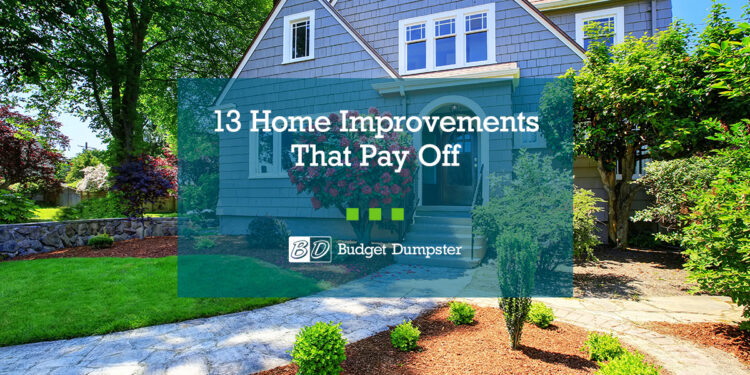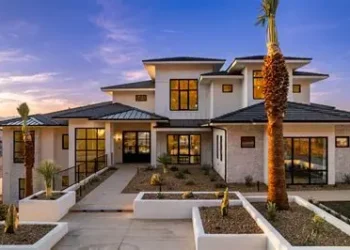Exploring the realm of exterior upgrades and their impact on property investments, this discussion delves into the importance of enhancing curb appeal, boosting energy efficiency, and ultimately increasing the overall value of a property.
As we navigate through the various types of upgrades, cost-benefit analysis, considerations between professionals and DIY projects, and the environmental implications, a comprehensive understanding of the ROI of investing in exterior upgrades unfolds.
Importance of Exterior Upgrades
Investing in exterior upgrades for a property is crucial for various reasons. Not only do exterior upgrades enhance the overall appearance of a property, but they also significantly increase curb appeal and boost the property's value.
Enhanced Curb Appeal and Property Value
Exterior upgrades such as fresh paint, landscaping, updated siding, and modern fixtures can greatly enhance the curb appeal of a property. A well-maintained and visually appealing exterior can attract potential buyers and increase the property's overall value.
Energy Efficiency and Cost Savings
In addition to aesthetics, exterior upgrades can also contribute to energy efficiency and cost savings. For example, installing energy-efficient windows, doors, and insulation can help reduce energy consumption and lower utility bills. Investing in exterior upgrades that improve insulation and ventilation can create a more comfortable indoor environment while reducing energy costs in the long run.
Types of Exterior Upgrades
Investing in exterior upgrades can significantly enhance the overall appeal and value of a property. Different types of exterior upgrades play a crucial role in transforming the look and functionality of a home.
Landscaping
Landscaping is a popular exterior upgrade that can instantly boost curb appeal. Well-maintained gardens, walkways, and outdoor living spaces can create a welcoming atmosphere and increase the property's value. Landscaping also helps in improving energy efficiency by providing shade and reducing heat absorption.
Siding
Upgrading the siding of a home can not only improve its appearance but also enhance insulation and protect against the elements. Options like vinyl, wood, fiber cement, or stone veneer siding offer durability and aesthetic appeal. Quality siding can increase the property's resale value and reduce maintenance costs in the long run.
Roofing
A new roof not only enhances the exterior look of a property but also provides essential protection against weather damage. Investing in high-quality roofing materials can improve energy efficiency and prolong the lifespan of the home. Additionally, a well-maintained roof adds to the overall value of the property.
Windows
Upgrading windows can have a significant impact on energy efficiency, natural light, and noise reduction. Energy-efficient windows can lower heating and cooling costs, while enhancing the comfort and aesthetics of the home. Modern window designs also contribute to better ventilation and security.
Doors
Replacing or upgrading doors can improve security, energy efficiency, and aesthetic appeal. Entry doors are not only the first impression of a home but also play a crucial role in insulation and protection. Investing in high-quality doors can enhance curb appeal and provide a good return on investment.
Cost-Benefit Analysis
Investing in exterior upgrades can bring a significant return on investment. Let's break down the cost-benefit analysis to understand the financial implications of such improvements.
Initial Investment vs. Long-Term Savings
When considering exterior upgrades such as new windows, siding, or roofing, the initial cost may seem high. However, these upgrades can lead to long-term savings on energy bills. Energy-efficient windows and insulation can reduce heating and cooling costs, while durable siding and roofing can lower maintenance expenses over time.
It's essential to weigh the upfront investment against the potential savings in the long run.
Increased Property Value
One of the most significant benefits of exterior upgrades is the boost in property value. A well-maintained exterior enhances curb appeal, making your home more attractive to potential buyers. Studies have shown that certain upgrades, like a new garage door or landscaping improvements, can increase the resale value of a property.
By investing in these enhancements, you not only enjoy a more appealing home but also potentially higher returns when selling
.
Potential Funding Options or Incentives
There are various funding options and incentives available to help offset the costs of exterior upgrades. Some local governments offer grants or tax credits for energy-efficient improvements, encouraging homeowners to invest in sustainable upgrades. Additionally, financing options such as home improvement loans or equity lines of credit can provide the necessary funds for renovations.
By exploring these options, homeowners can make exterior upgrades more affordable and financially beneficial in the long term.
Hiring Professionals vs. DIY
When it comes to exterior upgrades, deciding between hiring professionals or doing it yourself can be a crucial choice that impacts the outcome of your project. Let's explore the benefits and drawbacks of each option to help you make an informed decision.
Benefits of Hiring Professionals
- Expertise: Professionals have the knowledge and experience to tackle complex exterior projects efficiently and effectively.
- Quality Work: Contractors are likely to deliver high-quality results, ensuring that your upgrades are durable and visually appealing.
- Time-Saving: Hiring professionals can save you time and effort, as they can complete the project faster than if you were to do it yourself.
- Insurance Coverage: Most reputable contractors have insurance coverage, providing you with protection in case of accidents or damages during the project.
Drawbacks of Hiring Professionals
- Cost: Hiring professionals can be more expensive than tackling the project yourself, as you will need to pay for labor and materials.
- Lack of Control: You may have less control over the project when hiring professionals, as they will make decisions based on their expertise.
- Communication Challenges: Misunderstandings or miscommunications can occur when working with contractors, leading to delays or issues with the project.
Tips for Choosing the Right Contractors
- Research: Look for contractors with positive reviews, a good reputation, and experience in the specific type of exterior upgrades you need.
- Get Multiple Quotes: Compare quotes from different contractors to ensure you are getting a fair price for the project.
- Check Credentials: Verify that the contractor is licensed, insured, and bonded to protect yourself and your property.
- Ask for References: Request references from past clients to get an idea of the contractor's work quality and professionalism.
Importance of Permits and Regulations
- Permits: Before starting any exterior upgrades, check if permits are required in your area to avoid legal issues or fines.
- Regulations: Be aware of local building codes and regulations to ensure that your upgrades meet safety and quality standards.
- Compliance: Failure to comply with permits and regulations can result in costly delays or even the need to undo completed work.
Environmental Impact
Investing in eco-friendly exterior upgrades can have a positive impact on the environment by reducing energy consumption, minimizing waste, and promoting sustainability. By choosing sustainable materials and practices for exterior renovations, homeowners can contribute to a healthier planet while also enjoying the benefits of a more energy-efficient and environmentally friendly home.
Examples of Sustainable Materials and Practices
- Using recycled or reclaimed materials for siding, roofing, and decking can reduce the demand for new resources and lower the carbon footprint of the renovation project.
- Installing energy-efficient windows and doors can improve insulation and reduce heating and cooling costs, while also decreasing greenhouse gas emissions.
- Incorporating solar panels or a green roof can harness renewable energy sources and promote biodiversity, further enhancing the eco-friendliness of the property.
- Implementing rainwater harvesting systems or permeable paving can help manage stormwater runoff and reduce water waste, benefiting both the environment and the community.
Attracting Environmentally Conscious Buyers and Tenants
By showcasing environmentally friendly upgrades in your property, you can attract buyers and tenants who prioritize sustainability and eco-conscious living. Features such as energy-efficient appliances, low-flow fixtures, and native landscaping can appeal to individuals seeking a greener lifestyle. Additionally, certifications like LEED or Energy Star ratings can highlight the eco-friendly aspects of the home, making it more attractive to environmentally conscious consumers.
Last Recap
In conclusion, the ROI of investing in exterior upgrades proves to be a strategic move for property owners looking to elevate their property's aesthetics, functionality, and eco-friendliness. By making informed decisions and exploring the available options, one can truly transform their property into a valuable asset with long-term benefits.
General Inquiries
How do exterior upgrades enhance curb appeal?
Exterior upgrades like landscaping, siding, and new windows can significantly improve the visual appeal of a property, making it more attractive to potential buyers or tenants.
What funding options are available for exterior upgrades?
Depending on the location, there may be government incentives, tax credits, or financing options like home improvement loans that can help offset the cost of exterior upgrades.
Is it better to hire professionals or do exterior upgrades yourself?
While DIY projects can save money, hiring professionals ensures quality work and adherence to regulations. It's crucial to weigh the pros and cons based on the complexity of the upgrades.
How can eco-friendly exterior upgrades benefit property owners?
Investing in sustainable materials and practices not only reduces environmental impact but also attracts environmentally conscious buyers or tenants who value properties with eco-friendly features.













